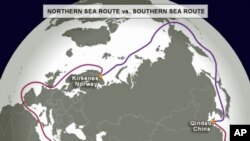For centuries, European explorers dreamed of sailing over the top of Russia to Asia. Now, climate change is melting enough Arctic ice to make this northern route a reality.
On Monday, a ship loaded with Norwegian iron ore is expected to dock in Qingdao, China, marking the first passage of a commercial cargo ship from Europe to Asia through the Arctic waters. The trip sliced 15 days and more than 8,000 kilometers off the conventional route, through the Suez Canal and past the Horn of Africa.
In past centuries, scores of Arctic adventurers died trying to make through this passage. This time, climate change made the difference.
According to the University of Colorado's National Snow and Ice Data Center, ice in the Arctic this summer shrank to its third lowest level on record. With summer ice running in recent years at 40 percent below the historical average, the Colorado scientists predict that by 2030, the North Pole will be a blue sea by late summer.
This change resulted in smooth sailing for the Norwegian bulk carrier, Nordic Barents. On September 4, the ship left Kirkenes, on Norway's northern tip - and headed east. Christian Bonfils, managing director of the Nordic Bulk Carriers, a Danish ship operator, said his ship's captain found open water 85 percent of the way:
"If there is a lot of ice, you cannot go full speed," said Christian Bonfils. "But with the ice we saw and experienced, we managed to go full speed almost all way."
In addition to saving on fuel, labor, and shipping time, the shippers did not have to pay for Suez Canal passage fees and anti-piracy insurance surcharges. Factoring the cost of Arctic insurance and an escort by a Russian ice breaker, he said his company saved thousands of dollars.
'"If we can start to use the Northern Sea Route every year, we will get a double winter season for our ships, because we can get the ice premium in summer time," he said. "The same goes for the Russians, they will be able to employ their ice breakers in the summer season."
Rune Rafaelsen runs a development agency in Kerkenes:
Last year, he said, iron ore demand from Chinese steel mills stretched around the world to revive production at a shuttered iron mine in his hometown. He predicts that the northern sea route will breathe new life into northern Norwegian ports. Speaking at an Arctic conference here, he predicted regular, late summer convoys of ships from Europe to Asia.
"They went directly to China and it went much faster than they expected," said Rune Rafaelsen.
Russia and Norway, once cold war enemies, are moving fast to lower transportation and investment barriers in the Arctic.
Last week, the two countries signed a treaty resolving a long-standing Arctic ocean territorial dispute. Now, the two countries are negotiating visa-free travel for northern residents. This week, Russian officials announced construction of 10 maritime search-and-rescue stations along the 6,400-kilometer route from Murmansk to the Bering Strait.
But environmentalists warn of pollution from wrecks and spills in a still treacherous part of the world.
Bill Eichbaum, marine and arctic policy expert for the World Wildlife Fund, traveled from the United States to speak at the Arctic conference in Moscow:
"The environmental concerns are great," said Bill Eichbaum. "There is very little search and rescue. There is very little spill control. Navigation and charting are not as extensive as in more heavily traveled areas."
From the Russian side, Nikita Ovsyanikov, deputy director of a Russian wildlife reserve on Wrangel Island, worries about the increase in shipping. Located near the top of the Bering Strait, Wrangel is a UNESCO World Heritage site and a major breeding ground for polar bears.
"There is always some probability of crash, of ship wreck, oil spill, if it is a tanker," said Nikita Ovsyanikov. "So there is always certainly a risk."
But the message from the Arctic conference was clear: Thanks to global warming, the era of commercial exploitation of the Arctic may only be beginning.
Global Warming Gives Boost to Commercial Cargo Business
- By James Brooke




